My journey to getting real about diabetes
We all have our own diabetes story. The team at Get Real About Diabetes™ asked me about mine and here it is.
2002. I had all the classic symptoms—excessive thirst, constantly going to the bathroom, etc. At one point, I drank an absurd amount of water over a couple hours, and I knew something was going on.
I didn’t take it as seriously as I should have. I took the medicine my health care provider first prescribed, but I didn’t commit to eating healthy and being active like I needed to.
About 10 years ago, my dad passed away from type 2 diabetes complications. That was really tough, especially knowing that if my dad had taken better care of himself, he might still be here. That was a real wake-up call for me. I didn’t want to just be a memory for my family, I wanted to be there. So I vowed right then and there that I would get serious about managing my diabetes.

Man, I changed a lot. I needed a fresh start, to leave all my old ways behind.

I started with my diet. A nutritionist helped me cut out unnecessary carbs and gave me an action plan to eat healthier and cleaner. To be active, I started biking. Almost everywhere I went, I either walked or biked.
It made a huge difference. I lost a bunch of weight. I felt so much better, and the eating healthy and being active got easier over time.
And my blood sugar level was under control, probably for the first time since I was diagnosed. It wasn’t as bad as I thought it would be to change my lifestyle how I did.
When I was living in New York, I was stubborn, but my endocrinologist helped me understand why medication is necessary to help control diabetes. Given how the disease progresses, no matter how well you eat or how active you are, you’re likely going to need some help from other medications to keep your blood sugar in check.
Later on, my endocrinologist prescribed an injectable medicine. At first, I was not a fan of that. I really didn’t want to be on another medication.
Yep. At first, I really resisted it. I told my endocrinologist to give me 3 months. I thought I could get my blood sugar level back under control if I really hit my diet and workout plan hard. But it didn’t work. My blood sugar was still high.
My endocrinologist said that it wasn’t my fault that I had to take an injectable. It’s just how diabetes is; it changes over time. So, I started giving myself an injection, and now it’s just a part of my routine.
It’s some scary stuff! As if diabetes isn’t tough enough, you also have to worry about getting cardiovascular disease, which can lead to death way before you’re ready to go.
I prioritize seeing my diabetes care team regularly, so they can keep an eye on my heart, and we can talk about what I can do.

Other people with diabetes often ask me, “Anthony, what’s your secret?” Truth is, there’s no secret to managing diabetes, it just takes commitment and resolve every day.
One thing I would say is to not wait. Get real now. I’ve learned that you’re either managing your diabetes, or it’s hurting you. That’s just how diabetes works. Find your motivation and run with it. Whether it’s being there for your family, the things you still want to accomplish in life, the places you want to go. And focus on all those things and let them drive you.
Believe me, if I can do it, you can, too.

It's so worth it.
Know your cardiovascular risk—and what you can do about it
Recognizing the link between cardiovascular disease and type 2 diabetes is the first step toward lowering your risk.
Make yourself a diabetes care plan
Be sure to regularly talk to your diabetes care team. They’re your secret weapon.


